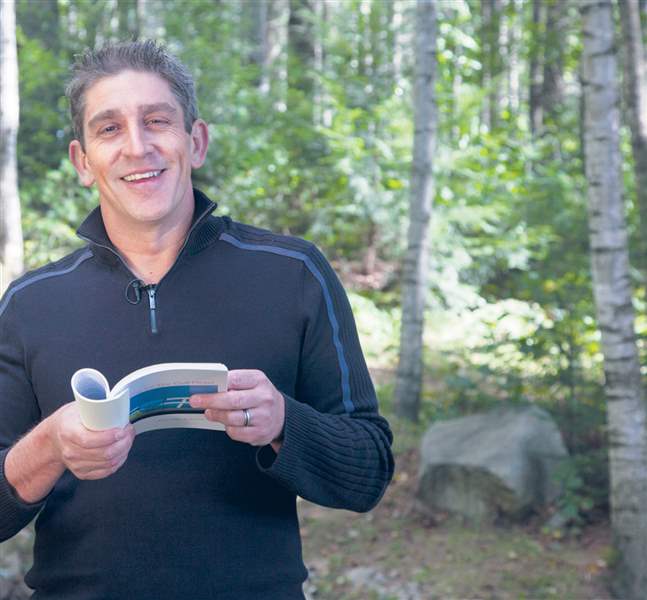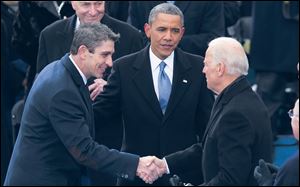
ENTERTAINMENT
Pioneering Poet: Richard Blanco
Inaugural poet to speak at BGSU
4/2/2014
Richard Blanco will give a free talk at 12:30 p.m. today at Bowling Green State University, followed by a book signing at 1:30.
GETTY IMAGES

Richard Blanco meets with President Obama and Vice President Biden at the inauguration Jan. 13, 2013 in Washington.
One Day, the poem Richard Blanco wrote and read at the Jan. 13, 2013, inauguration of President Obama, is a hopeful ode to a democracy enriched by different cultures, experiences, work, and geographies. Some called it a modest poem.
It repeats the refrain that all Americans live under one sun, one sky, one moon; all tread the same earth. And it ends with the orb of night:
One sun rose on us today, kindled over our shores,
peeking over the Smokies, greeting the faces
of the Great Lakes, spreading a simple truth
across the Great Plains, then charging across the Rockies.
One light, waking up rooftops, under each one, a story
told by our silent gestures moving behind windows.
My face, your face, millions of faces in morning's mirrors,
each one yawning to life, crescendoing into our day:
pencil-yellow school buses, the rhythm of traffic lights,
fruit stands: apples, limes, and oranges arrayed like rainbows
begging our praise. Silver trucks heavy with oil or paper—
bricks or milk, teeming over highways alongside us,
on our way to clean tables, read ledgers, or save lives—
to teach geometry, or ring-up groceries as my mother did
for twenty years, so I could write this poem.
All of us as vital as the one light we move through,
the same light on blackboards with lessons for the day:
equations to solve, history to question, or atoms imagined,
the "I have a dream" we keep dreaming,
or the impossible vocabulary of sorrow that won't explain
the empty desks of twenty children marked absent
today, and forever. Many prayers, but one light
breathing color into stained glass windows,
life into the faces of bronze statues, warmth
onto the steps of our museums and park benches
as mothers watch children slide into the day.
One ground. Our ground, rooting us to every stalk
of corn, every head of wheat sown by sweat
and hands, hands gleaning coal or planting windmills
in deserts and hilltops that keep us warm, hands
digging trenches, routing pipes and cables, hands
as worn as my father's cutting sugarcane
so my brother and I could have books and shoes.
The dust of farms and deserts, cities and plains
mingled by one wind—our breath. Breathe. Hear it
through the day's gorgeous din of honking cabs,
buses launching down avenues, the symphony
of footsteps, guitars, and screeching subways,
the unexpected song bird on your clothes line.
Hear: squeaky playground swings, trains whistling,
or whispers across café tables, Hear: the doors we open
for each other all day, saying: hello, shalom,
buon giorno, howdy, namaste, or buenos días
in the language my mother taught me—in every language
spoken into one wind carrying our lives
without prejudice, as these words break from my lips.
One sky: since the Appalachians and Sierras claimed
their majesty, and the Mississippi and Colorado worked
their way to the sea. Thank the work of our hands:
weaving steel into bridges, finishing one more report
for the boss on time, stitching another wound
or uniform, the first brush stroke on a portrait,
or the last floor on the Freedom Tower
jutting into a sky that yields to our resilience.
One sky, toward which we sometimes lift our eyes
tired from work: some days guessing at the weather
of our lives, some days giving thanks for a love
that loves you back, sometimes praising a mother
who knew how to give, or forgiving a father
who couldn't give what you wanted.
We head home: through the gloss of rain or weight
of snow, or the plum blush of dusk, but always—home,
always under one sky, our sky. And always one moon
like a silent drum tapping on every rooftop
and every window, of one country—all of us—
facing the stars
hope—a new constellation
waiting for us to map it,
waiting for us to name it—together.
We head home ... “always under one sky, our sky. And always one moon like a silent drum tapping on every rooftop and every window, of one country — all of us — facing the stars/hope — a new constellation waiting for us to map it, waiting for us to name it — together.”
Blanco, 46, broke some records as an inaugural poet: He was the youngest (44 at the time), first openly gay, first Hispanic or Latino, and first immigrant.
He will give a free talk at 12:30 p.m. today followed by a 1:30 book signing at the Latino Issues Conference at Bowling Green State University’s student union ballroom.
That cold winter day on the Washington podium, watched by more people than he’ll ever be seen by, Blanco had an epiphany: He understood he was, finally, an American. “I realized mine was an American story all along,” he said.
When the inaugural committee first asked him to submit three sample poems, “I thought about my parents and grandparents and all the sacrifices they made to make it easier for me in the world. And their emphasis on education.”
He also knew that poetry would be his life work. And that his topics would change. For 20 years, he’d written about what his “place at the [American] table is ... I’m eager now to explore more questions about America and the American identity.”
He was the fifth poet invited to craft exquisite language for the quadrennial ceremony. At John F. Kennedy’s inauguration in 1961, an 86-year-old Robert Frost fumbled with wind-blown papers before giving up and reciting a poem from memory. It was another 32 years before Maya Angelou and four years later Miller Williams (father of singer Lucinda Williams) would be inviited to speak at President Bill Clinton’s formal inductions. Elizabeth Alexander read at President Obama’s first inauguration.
As an appreciation for One Day, he and his partner, Mark Neveu, were invited to the Oval Office in May.
“That was more nerve wracking than the inauguration. You have this idea of who someone is. The President is who you see; he’s like the president next door, very, very friendly and very disarming.”
Blanco’s parents had been expelled from Cuba when he was an infant, and immigrated to the United States via a brief stint in Spain. They settled in a Cuban neighborhood in Miami where he grew up feeling parts Cuban and American. His mother had been a teacher in Cuba, but took jobs in a grocery store and as a bank teller. His father, who’d been studying at Cuba’s naval academy, worked as a butcher and bookkeeper.
Blanco became a civil engineer, scribbling poetry at night. He studied it at a community college, then earned a master’s degree in creative writing, publishing his thesis to critical acclaim. Poems swirled around his own unclear identity: How did culture and sexuality affect the way he negotiated life?
He resides in the scenic foothills of the White Mountains in Bethel, Maine, with Neveu, a scientist and his partner of 14 years.
“I always dreamed of living in rural small-town America,” Blanco said.
He reads nonfiction spiritual books written by Ken Wilber, Marianne Williamson, and Eckhart Tolle, author of a particular favorite, A New Earth. “It’s an extensive look at the human condition told in a very simple way and a very poetic way.”
Blanco said he’ll speak today about his emotional journey to the White House and how his life and views on poetry have changed. After the nation heard One Day, thousands of people from all walks of life wrote to say they were touched by it. In November, he published For All of Us, One Today, a memoir in English and Spanish chronicling his experiences creating the poems commissioned for the inaugural.
“All people really can appreciate poetry,” he said, noting he’s since given keynote talks at meetings of engineers, lawyers, and a fragrance firm. “People aren’t exposed to contemporary poetry enough. I want to create converts,” he said.
Think of poetry as a campfire, around which we can gather to gaze at dancing flames, contemplate, share stories, and be soothed, he said.
“Poetry’s roots are in old-world traditions. It’s used to mourn, to honor, to heal, to celebrate. I want to explore how we can support educators to teach poetry so that it makes a connection earlier in life. I’m still exploring how to do it, providing study guides — and this is all talk now — that we can put in the hands of every English teacher for free.
“I hope people will give [poetry] a chance. It speaks a truth.”
Contact Tahree Lane at tlane@theblade.com or 419-724-6075.